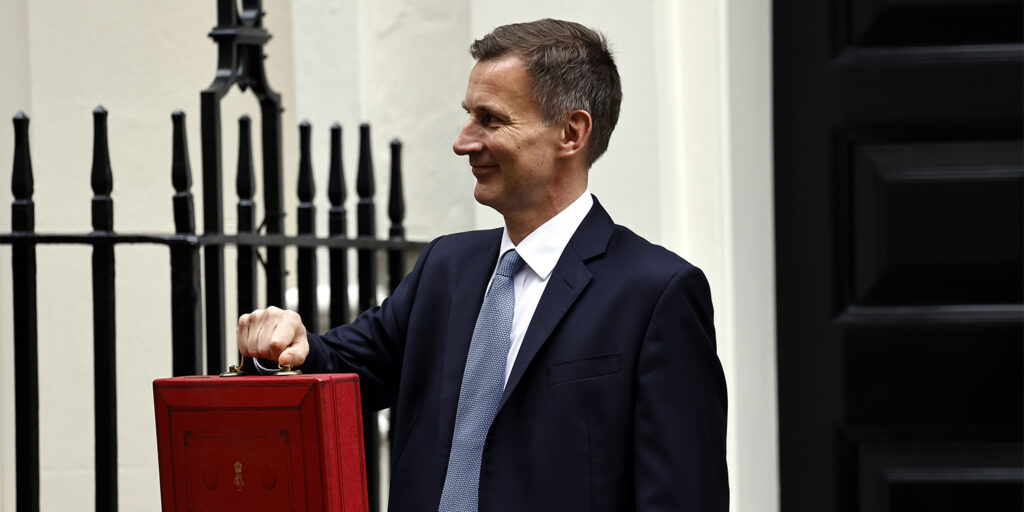Government efforts to boost the economy and restimulate growth have been met with mixed reactions from UK businesses.
New measures to drive recruitment and revive investment were generally well received in Chancellor Jeremy Hunt’s Spring Budget delivery earlier this month, but the absence of further support with burdensome energy bills and an impending corporate tax hike has left many businesses feeling downhearted.
Martin McTague, national chair for the Federation of Small Businesses (FSB), said the news would leave tens of thousands of small companies feeling “short-changed”, adding: “The distinct lack of new support in core areas proves that small firms are overlooked and undervalued.”
Corporation tax set to rise
In one of the biggest reversals of tax policy in a decade, it was confirmed that from 1 April, the corporation tax rate will rise from 19% to 25%.
The increase will impact those with profits of more than £250,000, while smaller businesses with profits below £50,000 will continue paying the current rate of 19%.
Those in the middle – with profits over the lower limit of £50,000 but less than the higher limit of £250,000 will receive marginal relief. HMRC has created a dedicated calculator to help businesses work out what relief they are eligible for.
For short accounting periods and for those operating more than one company, the lower and upper limits will be proportionately reduced. The Government believes that up to 70% of businesses will remain unaffected by the tax hike, but the news has fuelled growing concerns that investment will continue to dwindle as a result.
The full expensing scheme
The news of the corporate tax increase was coupled with the announcement of a new scheme that the Chancellor said would help incentivise investment over the course of the next three years, which will replace the current ‘super-deduction’ scheme that is set to end on 31 March.
The new ‘full expensing’ scheme will come into force from 1 April and offers companies a less generous relief of 100% of the cost of capital equipment from their annual profits, instead of spreading the cost over multiple tax years.
Martin Beck, chief executive of the EY ITEM Club, said that:
“Allowing businesses to fully expense investment against taxable profits may only mitigate the impact of other incoming changes. The new investment incentive is time-limited, while the corporate tax rise is permanent.”
However, the Chancellor said there were hopes for the new scheme to become permanent following the initial three years.
The end of energy bill relief
After much anticipation, businesses were also informed that there would be no further energy bill support, despite the ongoing rise in costs.
Shevaun Haviland, director general for the British Chambers of Commerce (BCC) said that this was a decision that left firms with little comfort, commenting:
“Almost half of businesses have told us that they will struggle to pay their energy bills from April, and they cannot invest when they are fighting to survive.”
Instead of the previous Energy Bill Relief Scheme, there will instead be a new Energy Bills Discount Scheme available from 1 April, which will provide businesses with some relief in the form of a per-unit discount on their energy bills over the next 12 months.
Addressing the skills shortage
In a bid to combat the growing skills shortage, the Chancellor announced measures to add an extra one million employees to the UK workforce by increasing funding for support programmes in the form of ‘returnships’ for the most experienced members of society, the over-50s, as well as mention of a long-awaited childcare reform to help mothers back into work.
A silver lining in sight
Although the unwelcome tax increase and withdrawal of energy support will leave many businesses feeling dismayed, there was some hope to be gained with the Office for Budget Responsibility (OBR) forecasting that the UK would escape recession this year. A forecast that will hopefully help restore confidence in consumers who have been reluctant to spend over the past year due to the turbulent economic landscape.
Martin McTague concluded that more action was critically needed to support small businesses, stating:
“Action is what counts if we are to reverse the 500,000 small businesses lost over the last two years. It’s high time the Government put small firms at the top of the agenda and lend them the necessary support on the path to economic recovery.”
Thanks for reading
We hope you’ve found this update useful. What do you make of the latest announcements? Leave us a comment below to share your thoughts!
And keep an eye on our central blog hub for more news and insights like this.
Please note that the information provided in this article is for general informational purposes only and does not constitute legal, tax, or professional advice. While our aim is that the content is accurate and up to date, it should not be relied upon as a substitute for tailored advice from qualified professionals. We strongly recommend that you seek independent legal and tax advice specific to your circumstances before acting on any information contained in this article. We accept no responsibility or liability for any loss or damage that may result from your reliance on the information provided in this article. Use of the information contained in this article is entirely at your own risk.












Join The Discussion